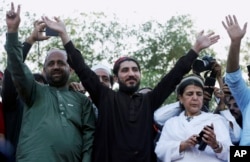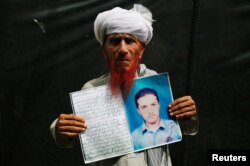The leader of a Pakistani ethnic Pashtun rights group vowed his movement would continue its protest rallies until justice has been achieved for members of the ethnic minority who have disappeared or been victims of extrajudicial killings.
On Sunday, the Pashtun Tahaffuz Movement (Pashtun Protection Movement, also PTM) staged its first rally in the southern city of Karachi, the site of the January killing by police of Pashtun youth Naqibullah Mehsud in Karachi, which sparked the movement and led to a series of nationwide protests.
PTM leader Manzoor Pashteen reached the rally’s location several hours after he was scheduled to speak. Party leaders accused authorities of blocking his convey at several points on its way to Karachi. Earlier, the PTM also claimed that Pashteen’s airplane ticket was canceled, forcing him to travel by road.
Pakistani authorities have not commented on these allegations.
In a reference to Pakistan’s security forces, whom Pashteen holds responsible for extrajudicial killings and enforced disappearances of Pashtuns, the PTM leader told the crowd he and his supporters would take the same course that "you have taken against us,” if forced.
“Don't forget that we know how to use force. But if we decided to do so, it will be disastrous for everyone and you will regret it," Pashteen told those at the rally.
The PTM has said several thousand extrajudicial killings have been carried out in Pakistan since it joined the U.S.-led war on terror and launched major military operations in 2009 and 2014 that targeted Pakistani Taliban strongholds in the Pashtun majority Federally Administered Tribal Areas (FATA) areas bordering Afghanistan.
Activists have said the Pashtun ethnic minority have been subjected to years of abuse, discrimination and violence under the guise of military operations against the Pakistani Taliban.
Pakistan military spokesman Maj. Gen. Asif Ghafoor acknowledged that people living in Pakistan’s tribal areas, mostly Pashtuns, have paid a heavy price due to militancy and the subsequent military operation.
Ghafoor said they were already working to meet the demands previously placed before the authorities after a sit-in protest in the capital, Islamabad. Those demands included the removal of unexploded ordnances in tribal areas left behind from years of fighting and the reduction of the number of military checkpoints in tribal areas.
Those at the rally Sunday included families of missing persons holding pictures of their loved ones who they say were taken by security officials. The families say they have not received any information since the disappearances, some of them more than a decade ago.
The PTM estimates there are more than 5,000 such cases.
There was heavy police and security presence in and around the PTM gathering and VOA confirmed from independent sources that at least a dozen PTM workers had been rounded up in an apparent attempt to dissuade participation.
Various civil rights groups, including the Human Rights Commission of Pakistan, joined the Pashtun movement in their call for justice. They have also urged authorities not to crack down on PTM supporters, who have remained peaceful.
VOA's Urdu Service contributed to this report. Some material came from Reuters.







